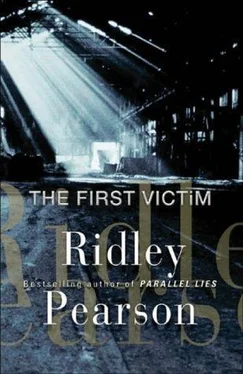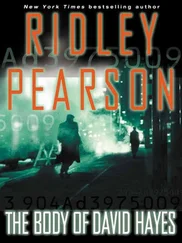Ridley Pearson - The First Victim
Здесь есть возможность читать онлайн «Ridley Pearson - The First Victim» весь текст электронной книги совершенно бесплатно (целиком полную версию без сокращений). В некоторых случаях можно слушать аудио, скачать через торрент в формате fb2 и присутствует краткое содержание. Жанр: Триллер, на английском языке. Описание произведения, (предисловие) а так же отзывы посетителей доступны на портале библиотеки ЛибКат.
- Название:The First Victim
- Автор:
- Жанр:
- Год:неизвестен
- ISBN:нет данных
- Рейтинг книги:3 / 5. Голосов: 1
-
Избранное:Добавить в избранное
- Отзывы:
-
Ваша оценка:
- 60
- 1
- 2
- 3
- 4
- 5
The First Victim: краткое содержание, описание и аннотация
Предлагаем к чтению аннотацию, описание, краткое содержание или предисловие (зависит от того, что написал сам автор книги «The First Victim»). Если вы не нашли необходимую информацию о книге — напишите в комментариях, мы постараемся отыскать её.
The First Victim — читать онлайн бесплатно полную книгу (весь текст) целиком
Ниже представлен текст книги, разбитый по страницам. Система сохранения места последней прочитанной страницы, позволяет с удобством читать онлайн бесплатно книгу «The First Victim», без необходимости каждый раз заново искать на чём Вы остановились. Поставьте закладку, и сможете в любой момент перейти на страницу, на которой закончили чтение.
Интервал:
Закладка:
For once, LaMoia knew to keep his quick-witted adolescent comments to himself.
Another edit. A woman-Melissa? — stood in a dark bathroom working a razor on her scalp. The scene was only seconds long. She turned to face the camera and smiled. She said in a whisper, ‘‘This is Melissa Chow for KSTV News. I’m going undercover now. I will join the sweatshop’s general population. This is where I become one of them.’’
‘‘Oh, shit,’’ LaMoia said.
The woman reached out and turned off the camera. The screen flashed black.
‘‘The sound is so hollow,’’ Boldt remarked, his musician’s ears ever sensitive.
The sounds were of women’s voices speaking Chinese. The camera faded in from black to an extreme close-up of a woman’s face. She was bald. She spoke in whispered Chinese. The interview lasted close to a minute, the camera cropped at the crown of her head and the peak of her chin, the close-up dramatizing her words. Even without a translator, her message was of horrid conditions and fear; the tears told that much. Another fade to black, and then faded back in at yet another close-up of a different woman. There were three interviews in all. All done in whisper. All in Chinese, not a word of English spoken. The third was interrupted by a woman’s voice speaking harshly. A warning perhaps. The camera aimed down to show a dormitory of woven mats and polarfleece blankets. Several women slept. Most of the mats went empty. The screen went black and then fuzzy.
LaMoia and Boldt sat watching a gray sparkled screen. LaMoia turned down the sound. He fast-forwarded the tape, making sure they missed nothing. ‘‘You feel sick to your stomach?’’ he asked.
‘‘Did you ever play with Chinese handcuffs when you were a kid?’’ Boldt asked. ‘‘The woven tubes? You stuck your fingers inside?’’
‘‘Sure. I remember those. What about them?’’
‘‘The tube constricted. You could slip your fingers in, but you couldn’t pull them back out.’’
‘‘Those were chains on those ankles, Sarge.’’
‘‘It’s what happened to her,’’ Boldt said. ‘‘She got herself inside, but she couldn’t get back out.’’
‘‘Like Chinese handcuffs.’’
Boldt nodded. He felt better than he had in days. ‘‘The good news is, she can speak the language, and with her head shaved, she looks like everyone else.’’
‘‘You’re thinking she’s still alive,’’ LaMoia said, his troubled voice barely rising above a whisper. The tape had set a mood, had captured them.
‘‘I think she is, yes,’’ Boldt said, equally softly. ‘‘The camera surfacing challenges that, I know. But the reason we haven’t found her?’’ he asked rhetorically. ‘‘Is because they haven’t found her, either.’’ He turned to LaMoia in the dark, his silhouette captured by the light from the sparkling gray screen, making him look sickly and pallid. ‘‘Who knows?’’ Boldt said. ‘‘They may not even know she’s in there.’’
CHAPTER 35
"Can get you nice suit cheap,’’ Mama Lu told Boldt. She occupied most of the doorway of a building marked only in Chinese characters. She wore a red cotton tent dress, and leather sandals and she carried a rubber-tipped bamboo cane that didn’t look right on her. In the daylight, out of her dim lair, Boldt saw her as much younger, mid-fifties perhaps.
‘‘You don’t like this one?’’ Boldt complained.
‘‘It okay. A little big on you I think. Bad color. Too dark for skin tone. I have cousin.’’
‘‘Skin tone?’’ He had bought the suit on sale too many years ago to remember. Her comments made him self-conscious. He worried about how his suit might play in his later appointment.
She struck Boldt as something of a Chinese Winston Churchill the way she held the cane and faintly bowed to him as he spoke.
Boldt had sandwiched the stop between the conclusion of the video session with LaMoia and his upcoming job interview, intending to work the woman for information on the location of sweatshops. But she had other ideas.
Sensing his impatience and urgency, Mama Lu demanded they meet at a location of her choosing: a nondescript building on a busy street in the heart of the International District.
‘‘I have an appointment,’’ he continued.
‘‘This not take long,’’ she told him. Mama Lu set her own pace, her own tempo. In the world of jazz, she was a ballad, not bebop. ‘‘You will be so kind,’’ she said, indicating the door.
Boldt opened the door for her, stepping close enough to smell a faint trace of jasmine and was reminded of her gender, something easily forgotten when enveloped by her commanding presence. As she passed, he said softly, ‘‘Another woman was found dead. Another Chinese. Head shaved. Bad shape.’’ He caught himself slipping into her clipped mode of speech.
‘‘Chinese, or Chinese-American? You see, to us there is much difference, Mr. Both. I show you.’’ She led Boldt down a short red hallway and through a bright pink door into a large, open room filled with fifty or more Asian children. They sat at low tables in groups of five or six. Finger paintings hung from the fabric-covered walls; a hand-drawn English alphabet was draped above the blackboard like a banner. There were beanbags, dollhouses, plastic forts and a wall of books. It was busy but not loud. Xylophones hammered out halftone Chinese melodies.
Boldt read a modest plastic sign mounted to the wall and understood immediately that she was playing politics. Beneath the prominent Chinese characters on the sign were the words Hongyang Lu Child Center and Woman’s Shelter. Mama Lu was sole proprietor.
As if on cue-and he had to wonder about that-several adorable children ran to greet the great lady, clutching to her tent dress and jumping for her arms. Little dolls. Boldt thought of his own Sarah, and how quickly her childhood was slipping away. He was working long hours again, a pattern he had broken during Liz’s illness, and though there were a million justifications for it, he suddenly wondered if he was working or running from something. Daphne had put these thoughts in him, and he couldn’t get away from them.
Mama Lu interrupted his thoughts. ‘‘These my children: American citizens. They born here, live here. Grow up, make money, pay taxes.’’ She spoke in Chinese to the half dozen children crowding her and they ran back to their stations. ‘‘Older girls upstairs,’’ she said, pointing to the ceiling. ‘‘Different problems.’’
Boldt counted ten young adult women supervisors, far more per child than at his own children’s day care. One of these young women approached and spoke softly and cordially, welcoming them. Unless a well-conceived act, Mama Lu was no stranger here. The woman shook Boldt’s hand and asked if the police would ever consider coming and talking to the students. He offered to do so himself.
Mama Lu glowed with his offer. The woman headed back to her kids and Mama Lu said to Boldt, ‘‘This girl once part of shelter. Now teacher, give back to community. This free day care. Anyone welcome.’’
‘‘You’re a very generous woman.’’
‘‘Not point! Pay attention! Children American . No illegal. Born here means American citizens.’’
‘‘Whether or not their parents were or are legals, yes, I understand the way the laws work.’’
‘‘The laws not work,’’ she countered. ‘‘Pay attention. These children are alive, Mr. Both. They grow up, pay taxes. American citizens.’’
‘‘I understand,’’ Boldt replied.
In a menacing tone she hissed, ‘‘You understand nothing.’’
Boldt told her, ‘‘We have evidence. A videotape. Other evidence as well. There’s a sweatshop. . The people doing this will be caught and punished.’’ He allowed that to hang in the air along with the clanging xylophones and the joyous squeals. ‘‘Those who cooperate with us,’’ Boldt told her, ‘‘are treated differently in the eyes of the law.’’
Читать дальшеИнтервал:
Закладка:
Похожие книги на «The First Victim»
Представляем Вашему вниманию похожие книги на «The First Victim» списком для выбора. Мы отобрали схожую по названию и смыслу литературу в надежде предоставить читателям больше вариантов отыскать новые, интересные, ещё непрочитанные произведения.
Обсуждение, отзывы о книге «The First Victim» и просто собственные мнения читателей. Оставьте ваши комментарии, напишите, что Вы думаете о произведении, его смысле или главных героях. Укажите что конкретно понравилось, а что нет, и почему Вы так считаете.












